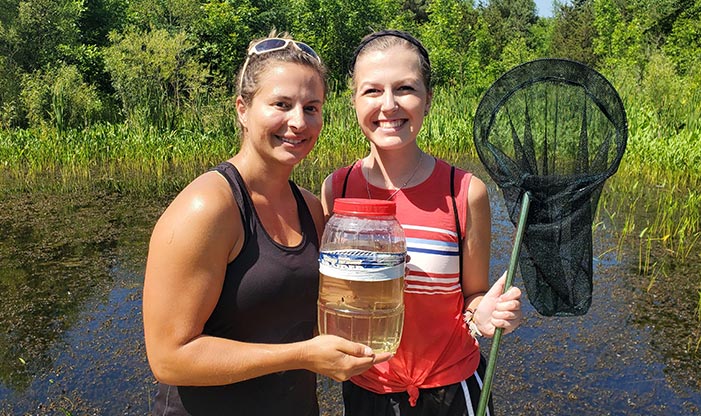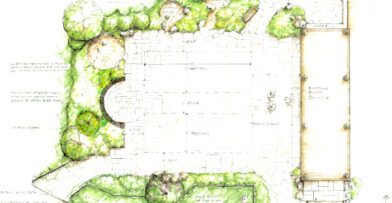Nature provides calmness and a sense of wellbeing. It often helps people who seek healing, and is a safe haven for people looking for solace while they are ill. To share the health benefits of being in nature with all people, Schlitz Audubon helps groups who have specialized needs enjoy an outdoor experience close to home.
Marc Korobkin is a longtime Schlitz Audubon member who experienced the rejuvenating effects of hiking at the Center, and he wanted to share it with others. At the same time, he saw the necessity for young cancer survivors in Milwaukee to have a place to be together away from a medical setting. “It’s important for people to know that younger people get cancer and often feel isolated. I saw that there was a need for people to come together,” Marc said. He also saw the opportunity to bring together local and national organizations to have a greater impact.
Partnering Organizations
After moving back to Milwaukee in 2016, Marc got involved with the Young Adult Oncology Group (YAOG), a peer support program of the MACC Fund Center at Children’s Hospital of Wisconsin and Froedtert Hospital. This program is designed to help young adult cancer survivors (between the ages of 18 to 40) share experiences and plan social, recreational, and educational activities.
Knowing how nature helped him while recovering from cancer treatment, Marc approached Tom Finley, our Director of Education. They discussed how this group could regularly have naturalist-led outdoor adventures specially designed to suit a group of survivors. Marc suggested partnering with YAOG and a national organization called First Descents.
Outdoor Programming
First Descents provides life-changing outdoor adventures for young adults (ages 18-39) impacted by cancer and other serious health conditions. These include weeklong whitewater kayaking, rock climbing, ice climbing, and surfing. Marc got involved with First Descents after attending a whitewater kayaking adventure in 2011. “The experience was transformative. We didn’t set out to talk about cancer, it just came up naturally,” Marc said. In 2019, Marc helped First Descents establish the new Milwaukee Tributary, a local adventure community, featuring weekend and single-day activities.
After Marc worked with Tom and these organizations, the partnership began meeting at the Center quarterly for two-hour guided hikes. The programs are designed to highlight the season and give attendees opportunities to connect with nature in new ways. Last winter, they snowshoed at the Center, and in July went on a Wetlands and Ponding Hike.
The outings are tailored to fit the group’s needs. The Wetlands Hike took place on a hot July day. So Tess Stahler, the Center’s naturalist who led the program, adjusted its schedule, beginning at Lake Michigan for its cooling effect. The walk wound through the tall trees of the forest, where it was cool and shady, then headed to Teal Pond where they learned about and identified aquatic creatures.
At these programs, conversations weave through the subjects of daily lives, including the experience of being treated for illness, but also careers, social life, as well as other nature adventures. The hikes are a place to be together, to talk about treatment, as well as daily life and personal challenges outside of a formal setting.
Nature and Healing
Researchers at the University of Exeter Medical School in England found that two hours a week is all it takes for people to experience noticeable effects of being in nature, including lowered blood pressure, a reduction in feelings of anxiety and depression, and improved creativity and cognition. The social aspect of group nature hiking helps people to connect, decreasing feelings of isolation that can occur with illness.
Marc appreciates that even when people spend shorter times in nature, as one would experience hiking at the Center, their health improves. He sees that after people participate in our programs, they often spend more time in nature. The program also serves as a stepping-stone to First Descents’ longer programs, either local multi-day weekend programs, or weeklong programs in other parts of the country.
The Future
Marc recently began a position at Gilda’s Club Madison, where he’ll implement a broad spectrum of programing for young adult cancer survivors and their supporters in Southern Wisconsin. The organizations supporting the programs at Schlitz Audubon are excited to bring Gilda’s Club into this partnership, expanding our ability to bring the benefits of nature to more people.
Besides this partnership, Schlitz Audubon currently provides need-specific programming for deaf and hard of hearing students from Rufus King High School, as well as with people experiencing cognitive changes through our SPARK! program. We invite other groups who would like enjoy guided hikes in our beautiful natural setting to contact us. It’s a pillar of our mission to provide nature experiences to all.


